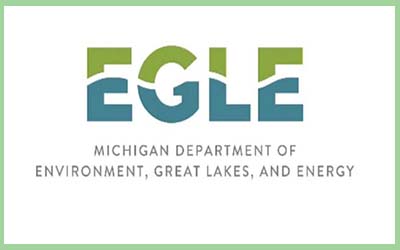
State of the Great Lakes report topics
|

|


FOR IMMEDIATE RELEASE March 1, 2022 Contact: [email protected]
Governor Whitmer Launches Growing MI Business Grant Program to Deliver $409 Million to Support Michigan Businesses and Grow Economy
LANSING, Mich. – Governor Gretchen Whitmer today announced applications are now being accepted through Thursday, March 31 for the new Growing MI Business grant program, which was signed into law at the end of last year to deliver $409 million in additional support to businesses across the state.
“My number one goal is to put Michigan first, and that means making sure Michigan businesses have the resources they need to build on our economic momentum,” said Governor Gretchen Whitmer. “Over the last year, my administration has worked hard to add 220,000 jobs and help businesses bounce back. The Growing MI Business Grant Program will make a difference for Michigan’s business owners and communities across our state. I will continue supporting Michigan’s resilient, innovative businesses as they work to expand operations and create more jobs.”
Under the Growing MI Business grant program, eligible businesses in operation before October 1, 2019, may receive a grant up to $5 million due to financial hardship. Eligible businesses that began operating between October 1, 2019, and May 31, 2020, may receive a grant equal to 25% of certain specified costs.
Effective today, individuals can apply for business resources online at www.michigan.gov/abr.
Each business must submit a completed online application to the Michigan Department of Treasury no later than 11:59 p.m. EST Thursday, March 31. Grant awardees will be notified in the spring and grant awards will be distributed by July 1, 2022.
Businesses interested in applying for a grant are encouraged to attend an information webinar from 1-2 p.m. EST on Monday, March 7. Details for signing up for the webinar can be found on the grant program’s website.
“Businesses thinking about applying are strongly encouraged to sign up for our March 7 webinar,” said State Treasurer Rachael Eubanks. “It will be a great opportunity to learn about the details of the program and ask questions. It is critical for businesses to submit a correct application to avoid processing delays or exclusion from the program.”
Growing MI Business grants may be prorated depending upon the number of businesses that apply to ensure that all eligible businesses can receive funding. Grants will not be distributed based on a first come, first serve basis.
Under state law, there are nine types of businesses eligible a grant:
Getting Things Done Governor Whitmer is committed to supporting small businesses as Michigan emerges from the pandemic and ushers in a new era of prosperity. Through COVID, the state implemented 23 economic relief programs for businesses, supporting more than 25,000 companies and retaining more than 200,000 jobs. Now, Governor Whitmer is dedicated to helping small businesses navigate existing programs and services available to help them recover and thrive for years to come. Recently, the governor laid out a $2.1 billion proposal to grow Michigan’s middle class, support small businesses, and invest in communities by tackling several underlying issues. As Michigan’s economic jumpstart continues, bolstered by a strong GDP, and a historic surplus, Governor Whitmer’s proposals will tackle underlying issues faced by small businesses and take advantage of the massive influx of federal resources Michigan has received to deliver meaningful change that makes a real difference for small businesses and Michigan workers.
Key Numbers
Additional information about the Growing MI Business Grant Program – including frequently asked questions, fact sheets and previously recorded webinars – can be found on www.michigan.gov/abr. |

|

FOR IMMEDIATE RELEASE March 1, 2022 Contact: [email protected]
Governor Whitmer Proclaims March 2022 as Women’s History Month
LANSING, Mich. – Governor Gretchen Whitmer today proclaimed March 2022 as Women’s History Month to honor women’s contributions in Michigan history.
“This month, we look to our past and honor those who secured footholds in the halls of power, shattered glass ceilings, and broke down doors to opportunity,” said Governor Gretchen Whitmer. “Each and every day, women across Michigan step up in incredible ways to get things done. But these are tough times, especially for women. That’s why we must work together, Democrats and Republicans, to create better opportunities for women and an economy that supports them and their families. I’m proud of what women in Michigan have accomplished, especially to strengthen our economy, and I’ll keep working with anyone to create even more progress for women.”
“We are honored to join with Governor Whitmer to celebrate her Administration’s investments in programs and services that remove barriers and promote access to opportunities for all of Michigan’s women to participate in our workforce, our communities and our families as our full and authentic selves,” said Muna Jondy, Chair of the Michigan Women’s Commission. “The Michigan Women’s Commission is committed to helping connect women to these resources and continuing to work with the Governor to further our recovery and advancement.
“As a medical professional, a mother, and a woman in Michigan, I am proud to work alongside Governor Whitmer to celebrate our frontliners and caregivers, reduce health care disparities, improve diversity and inclusion in all sectors, and amplify the physical, mental and economic recovery of Michigan’s women and our families as we transition from the pandemic to a new normal,” said Dr. Sabala Mandava Rao, Vice Chair of the Michigan Women’s Commission.
Governor Whitmer has centered Michigan’s women and families by pursuing policies that make a difference in their lives. The Governor will continue finding ways to deliver meaningful change that makes a difference in the lives of women and families.
Some of Governor Whitmer’s accomplishments include:
BUILDING ECONOMIC SECURITY
FOCUSING ON WOMEN’S HEALTH
ENSURING REPRESENTATION IN STATE GOVERNMENT
To view the full proclamation, click here
|